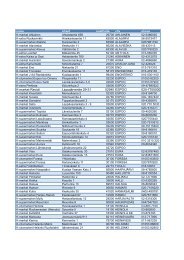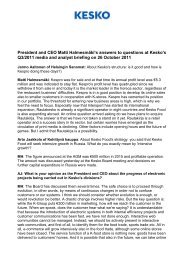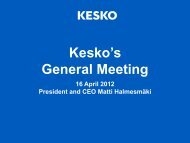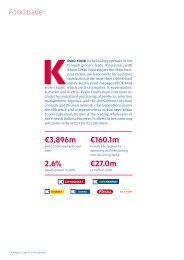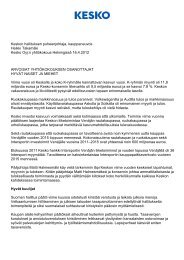You also want an ePaper? Increase the reach of your titles
YUMPU automatically turns print PDFs into web optimized ePapers that Google loves.
64 <strong>Kesko's</strong> <strong>year</strong> <strong>2007</strong><br />
which serve to increase price competitiveness and consumer-customers’<br />
satisfaction with retail stores’ offering and selection.<br />
Product safety and quality of the supply chain<br />
Kesko’s goal is to provide safe products for its customers. A failure in<br />
the quality assurance of the supply chain or in product control may<br />
result in financial losses, the loss of customer confidence or, in the<br />
worst case, a health hazard. In order to manage this risk the Product<br />
Research Unit controls the quality of products sold by Kesko Food and<br />
Anttila and also supervises companies manufacturing products for<br />
Kesko Food.<br />
The trading sector’s self-control practices play a key role in ensuring<br />
the quality of foodstuffs sold and the observance of regulations and<br />
rules concerning them. The practice of recalling products ensures that<br />
defective products are withdrawn from sale quickly. Ethical purchasing<br />
principles and related guidelines secures the ethical quality of<br />
products.<br />
Store sites<br />
Store sites are a strategic competitive factor. Considerable amounts of<br />
capital are tied up in store properties for decades. Local competitive situations<br />
can change fast and there is a risk that operations at the store<br />
site will become unprofitable. The risk is managed by long-term planning<br />
of the store network, by careful preparation of each store site<br />
investment decision and by applying a sell-lease back approach. When<br />
arranging construction, Kesko aims to ensure that the use of each<br />
store site can be flexibly changed, should a need arise.<br />
Contracts made on leased properties also take flexibility into<br />
account. The acquisition of new store sites can be delayed not only by<br />
shortage of sites, town planning and permit practices, but also by the<br />
price trends of sites and construction. Different countries also have<br />
their specific features. Online sales are growing, which affects the store<br />
network. Success in e-commerce requires a completely new kind of<br />
business expertise, logistics and information security solutions.<br />
Suppliers and distribution channels<br />
In business divisions that are strongly dependent on individual principals,<br />
changes in a principal’s or supplier’s strategy concerning the<br />
product selection, pricing and distribution channel solutions can mean<br />
a reduction in competitiveness or sales or loss of business. Good market<br />
shares, growing sales and development of operations create a basis<br />
for long-term cooperation.<br />
Shrinkage<br />
The retail trade involves a high risk of shrinkage. Shrinkage can result<br />
for example from spoilage or breakage of goods, theft or other malpractice,<br />
and unsuccessful purchasing, for example. The most important<br />
loss prevention activities include uniform measuring and monitoring<br />
of shrinkage, and the consequent development and introduction of new<br />
management methods. Loss resulting from unsuccessful purchasing is<br />
managed by surveying customer needs, planning selections carefully,<br />
and monitoring.<br />
Internationalisation<br />
Internationalisation aims at growth either through business acquisitions<br />
or expanding the existing store network. Success in international<br />
growth requires careful planning of acquisitions and expansion<br />
projects, resources and risk management. Challenges include different<br />
cultures, local business practices, authorities’ actions and fast-changing<br />
operating environments. Finnish retail trade operating processes<br />
and control practices cannot always be introduced as such outside Finland.<br />
The efficient steering of operations and the achievement of synergy<br />
benefits require implementation of common practices and information<br />
systems across country and organisational boundaries.<br />
Personnel<br />
Competition for skilled employees has intensified in the labour market.<br />
Recruiting competent employees and retaining their commitment is<br />
challenging particularly in the Baltic countries and Russia. Implementation<br />
of strategies requires competent and motivated personnel. There<br />
is a risk that the trading sector will not attract the most skilled people.<br />
Specialisation increases dependence on the competence of individuals.<br />
In updating strategies, the competencies required to implement the<br />
strategy are identified, and personnel plans are drawn up on that basis.<br />
Job satisfaction surveys play a central role in the development of management<br />
and leadership. Kesko’s employer image is redefined by systematic<br />
internal and external communications and stakeholder<br />
cooperation.<br />
Continuity of operations and information security<br />
The trading sector is characterised by increasingly complicated and<br />
long supply chains and their dependency on information systems, telecommunications<br />
and external service providers. Disturbances in the<br />
supply chain can cause major losses in sales and profit. These problems<br />
may be reflected to the customer in that there are no products<br />
available in the store or the store is closed. Kesko has continuity management<br />
projects underway which aim to secure undisturbed critical<br />
operations and a sufficiently fast recovery after a serious disturbance.<br />
The importance of information in business operations is increasing<br />
all the time. The requirements of stakeholders and the legislation to<br />
safeguard the handling of information in case of accidents and misuse<br />
have grown. Confidentiality of customer and employee information is<br />
protected with up-to-date information security solutions. Appropriate<br />
guidelines are also of key importance for keeping business secrets confidential.<br />
Critical transactions, such as payments, are protected with<br />
job descriptions, acceptance limits, access rights and system controls.<br />
Legislation, agreements and ethical principles<br />
Compliance with legislation, regulations, agreements and Kesko’s ethical<br />
principles is an important basic value. Non-compliance may result<br />
in fines, compensation for damages and other financial losses, and a<br />
loss of confidence or reputation. The Group has specific Compliance<br />
programmes to avoid this. Self-assessments are made in matters concerning<br />
competition legislation.<br />
Contractual risks are managed by harmonising agreements and<br />
agreement-making processes. An essential issue in the chain agreements<br />
between Kesko and the retailers is finding solutions for the<br />
high-quality delivery of customer promise and commitment to the<br />
chain business. The efficient steering of chain operations is, to some<br />
extent, complicated by interpretations of competition legislation.<br />
Kesko has specified its guidelines concerning responsible working<br />
principles and commenced the related communications and introduction.<br />
Discussions between managers and other employees are being<br />
arranged in connection with the key contents of the guide.



